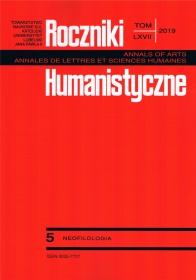The Annual Reports of the European Migration Network: A Comparative Analysis
Abstract
This research analyses six Annual Reports (AR) written by the European Migration Network, in particular two general AR (written in English) and four AR depending on its French and Italian National Contact Points (written in French and in English, respectively). It aims at studying the way in which paratext — namely Peircean diagrams (maps, boxes and charts) — does not only contribute to a better textual comprehension by the target public as compared with AR in which these tools are rare or lacking, but also convey their authors’ opinion. Our hypothesis, verified during the analysis, consists of inferring that the EMN chooses official and reliable data to catch public’s attention, so not respecting neutrality which may deal with an official report of an institution. If the usage of Peircean diagrams is wider in the EMN AR than in its NCP AR, these tools represent reliability for institutions and politicians who may be interested in reading them, but they are also a source of authority for editors who write them. This research is based on the analysis of expert and institutional discourse (Maingueneau 2002; 2004; Maris 2002; Cussó & Gobin 2008) and on its pragmatic outcomes (Bouchard 2015; Espeland 2015).
References
Adam, Jean-Michel. 2008. Les textes : types et prototypes. Récit, description, argumentation, explication et dialogue. Paris : Armand Colin.
Beacco, Jean-Claude. 1995. « À propos de la structuration des communautés discursives : beaux-arts et appréciatif », Les Carnets du Cediscor, 3. En ligne. Consulté le 23 novembre 2018. http://cediscor.revues.org/523.
Bontems, Vincent. 2013. « Le rôle des images des nanotechnologies (à l’intérieur et hors du champ scientifique) ». Dans L’image dans le texte scientifique. Édit par David Banks, 103–118. Paris : L’Harmattan.
Bouchard, Julie. 2015. « La médiatisation de l’évaluation et les flux de valeurs ». Dans La médiatisation de l’évaluation / Evaluation in the Media. Édit par Julie Bouchard, Étienne Candel, Hélène Cardy et Gustavo Gomez-Mejia, 1–23. Berne : Peter Lang.
Bourdieu, Pierre. 1982. Ce que parler veut dire. Paris : Minuit.
Cussó, Roser, et Corinne Gobin. 2008. « Du discours politique au discours expert : le changement politique mis hors débat ? ». Mots. Les langages du politique, 88. En ligne. Consulté le 23 novembre 2018. http://mots.revues.org/14203.
Espeland, Wendy. 2015. « Rankled by rankings : how media rankings redefined higher education ». La médiatisation de l’évaluation / Evaluation in the Media. Édit par Julie Bouchard, Étienne Candel, Hélène Cardy et Gustavo Gomez-Mejia, 25–37. Berne : Peter Lang.
Gadriot-Renard, Hélène. 2004. « L’anglais : lingua franca des institutions internationales ». Hérodote, 4, n° 115: 25–29.
Jacobi, Daniel. 1984. « Sémiotique du discours de vulgarisation scientifique ». Semen, no 2. En ligne. Consulté le 23 novembre 2018. http://semen.revues.org/4291.
Lejeune, Pierre. 2004. Discours d’experts en économie : Des Notes de conjoncture de l’Insee à la rubrique économique du Monde. Limoges : Lambert-Lucas.
Maingueneau, Dominique. 2002. « Les rapports des organisations internationales : un discours constituant ? ». Dans Les mots du pouvoir : Sens et non-sens de la rhétorique internationale, 119–132. Genève : Graduate Institute Publications. En ligne. Consulté le 23 novembre 2018. http://books.openedition.org/iheid/2457.
Maingueneau, Dominique. 2004. « Retour sur une catégorie : le genre », Texte et discours : catégories pour l’analyse, 107–118. Dijon : Éditions universitaires de Dijon.
Maris, Bernard. 2002. « Légitimation, autolégitimation, discours expert et discours savant ». Sciences de la société, 55 : 109–121.
Martinec, Radan, et Andrew Salway. 2005. « A system of text-image relations in new (and old) media ». Visual Communication, 4 (3) : 339–374.
Monte, Michèle, et Claire Oger. 2015. « La construction de l’autorité en contexte. L’effacement du dissensus dans les discours institutionnels ». Mots. Les langages du politique, 107. En ligne. Consulté le 23 novembre 2018. http://mots.revues.org/21847.
Née, Émilie, Claire Oger et Frédérique Sitri (dir.). 2017. Mots. Les langages du politique. 114, numéro thématique « Le rapport, entre description et recommandation ». En ligne. Consulté le 27 janvier 2019. https://journals.openedition.org/mots/22734.
Peirce, Charles Sanders. 1902. Selected Philosophical Writings. Bloomington : Indiana University Press.
Silletti, Alida Maria (2018). « Analyse des publications de l’Union européenne à visée vulgarisatrice : le cas des illustrations ».
Souchier, Emmanuël. 2004. « Mémoires — outils — langages. Vers une ‘société du texte’ ? ». Communication et langages, 139 : 41–52.
Copyright (c) 2019 Roczniki Humanistyczne

This work is licensed under a Creative Commons Attribution-NonCommercial-NoDerivatives 4.0 International License.





